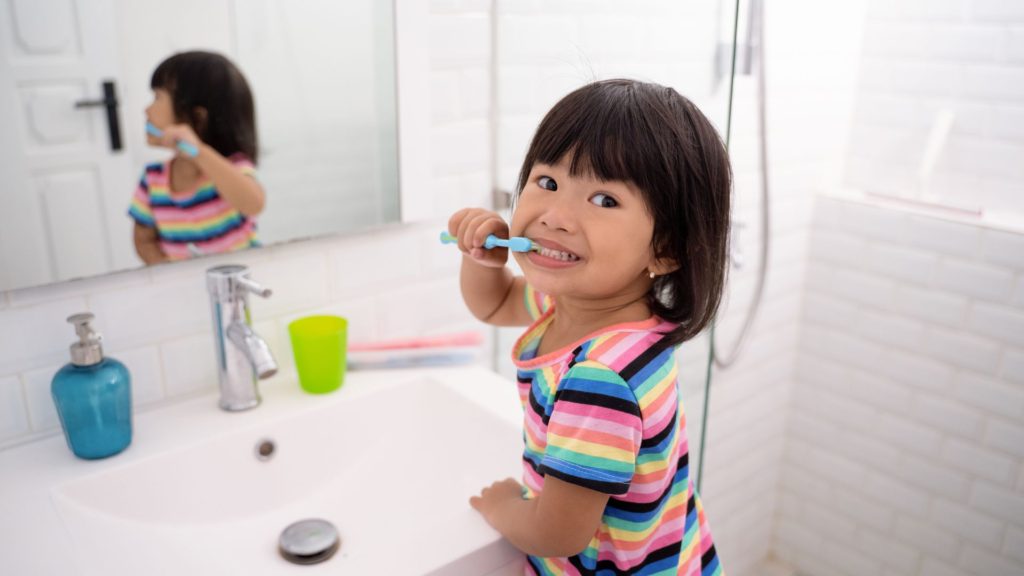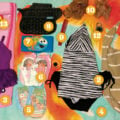Perhaps the thought occurred to you with a sharp headache and a grimace, as your toddler sweetly asked, “Can I help?”
Maybe you were shamed when — at the neighborhood barbecue — a handful of other parents were already talking about allowance. What? Before potty training?
Sometimes the subject comes up when we’re faced with a sudden request: Can I have a dog? A turtle? A cockroach? Something, anything living and breathing? Can you build me a sandbox? A vegetable garden? A lemonade stand?
We’re talking about chores, Toddler Parent.
Can your toddler handle the responsibility of a pet? A garden? A lemonade stand? Can she HELP? (Please, Mommy!) And furthermore, should she help?
Toddlerhood is marked with rapid shifts between extreme neediness and declarations of independence — also frustration when these two vastly different needs aren’t pretty much met instantly.
They need you to do certain things for them … NOW. They crave competence, praise and involvement in the family’s daily activities. And yet their abilities are limited, their skill sets untested.
So where to begin?
Let’s start with the bigger, murkier idea of “I want to help.”
When your toddler makes this proclamation, it’s usually in regards to the very adult task that’s distracting your attention from their unyielding cuteness.
They want to help make dinner, mow the lawn, build a campfire, iron clothes. These are the extremes, involving heat and heavy machinery, but you get the gist.
In these moments, you’re likely conflicted. I should let him be involved. I should teach and be patient. But by “help” your child means “make a mess and do it wrong and make it take twice as long.”
Let your mood be a barometer for the question of “help.” Parking ticket, stressful workday and an older sibling with strep? Not the day for you to accept help with flipping burgers on the grill. Mellow Sunday morning and the task is making banana bread? Sure!
It’s not a bad idea to have “diversion tasks” for your child to do along side your grown-up task. These “chores” aren’t bad for killing time on a rainy day, either. Some ideas include cleaning windows (with a plain water spray bottle), dusting with socks, brushing the cat, fluffing pillows, drawing a picture for Grandma or going on a trash hunt.
Use your imagination and put on your best “this is so important; you’re such a big girl” voice.
What else is appropriate?
If you want to take it a step further, with regular chores and responsibilities, there are some common age-appropriate duties for toddlers. Whether you offer allowance is up to you. Expectations that can be met by most 2- and 3-year-olds include:
• Putting dirty clothes in the hamper
• Helping put clothes in the washing machine
• Putting clean clothes away
• Weeding and watering plants
• Pushing a Swiffer
• Feeding pets
• Wiping up messes
• Washing up after a meal
• Picking up toys
• Picking up books
• Throwing trash away
• Fetching diapers and wipes for a younger sibling
• Showing a picture book to a younger sibling
• Emptying the dishwasher (when free of sharps and breakables)
• Making the bed
Know your kid
One final word or two on the subject of toddler chores: Practice makes slightly less imperfect. Lower your expectations A LOT and then lower them still. The bed will not have boot-camp-level hospital corners; the Swiffer path will be haphazard at best.
But they’ll practice, get a little bit better and feel useful in the process — and build up their self-esteem, bit by bit.
Jen Wittes lives in St. Paul and is a mother of two. She’s helped many Twin Cities families in her work as a postpartum doula.






















